It’s difficult to plan for your holiday in Korea, make an appointment, or plans with friends without talking about the days of the week in Korean. right?
To say all days of the week in Korean, all you need to know the words “wol-hwa-su-mok-geum-to-il”( 월-화-수-목-금-토-일 ) and add counter “요일”(yo-il) (means days of the week)at the end.
Here’s a free beginner’s lesson that will teach you all seven days of the week in Korean. You’ll learn what they mean and what to say with examples and exercises.
Never forget an important event in your life again! Get your free Korean flashcards, infographic cheat sheets, pdfs, quizzes, and audio (recorded by native speakers) right here.
All right world, it’s time to take you on.
Table of Contents
How Do You Say The Days Of The Week In Korean?|Monday to Sunday in Korean?
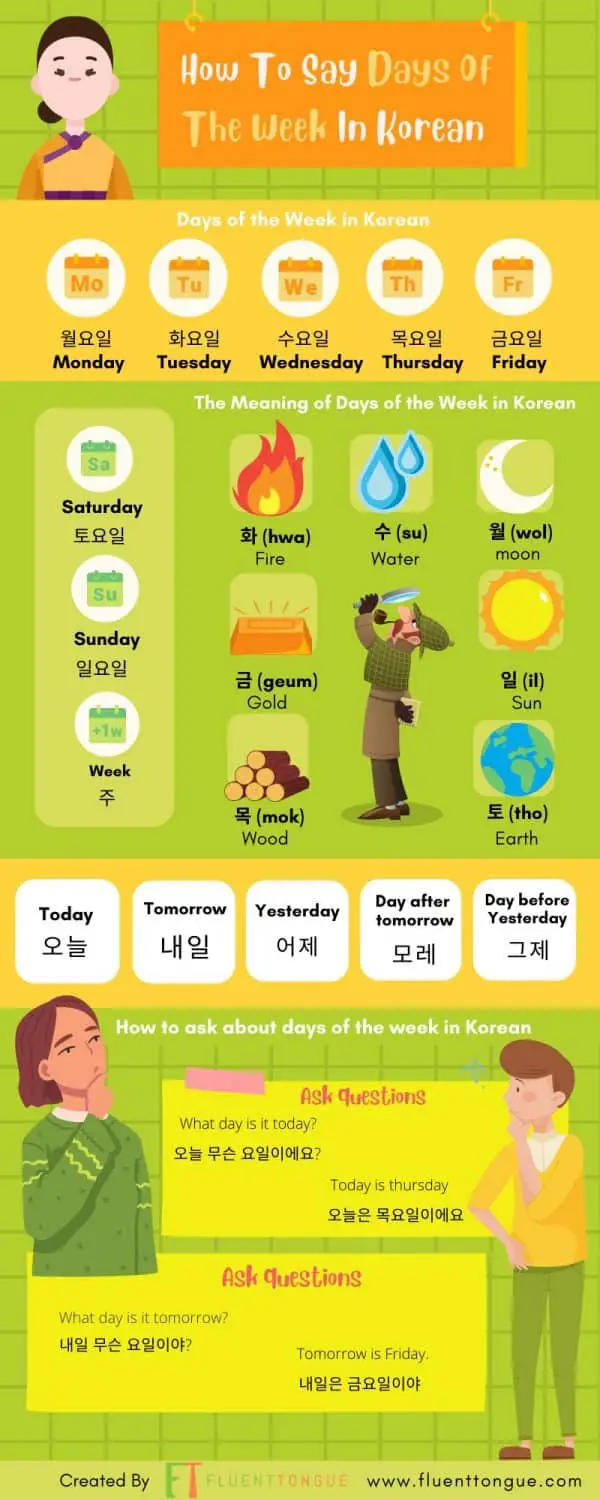
The Korean word for days of the week is 요일 (yo-il). To say all Korean days of the week, all you have to do is memorize the words “wol-hwa-su-mok-geum-to-il”( 월-화-수-목-금-토-일 ) and add “요일”(yo-il) at the end.
Here is how to say Monday to Sunday in Korean (all seven days of the week in Korean ).
- Monday in Korean – 월요일( wol-yo-il) – 월(wol) + 요일 (yo-il)
- Tuesday in Korean – 화요일(hwa-yo-il) – 화 (hwa) + 요일(yo-il)
- Wednesday in Korean – 수요일(su-yo-il) – 수(su) + 요일 (yo-il)
- Thursday in Korean – 목요일(mok-yo-il) – 목(mok) + 요일(yo-il)
- Friday in Korean – 금요일(geum-yo-il) – 금(geum) + 요일 (yo-il)
- Saturday in Korean – 토요일(to-yo-il)– 토(to) + 요일(yo-il)
- Sunday in Korean – 일요일 (il-yo-il)– 일(il)+ 요일 (yo-il)
Here’s the structure
월/화/수/목/금/토/일(wol-hwa-su-mok-geum-to-il) + 요일(yo-il)
Let’s start with how to say weekdays in Korean (Monday to Friday).
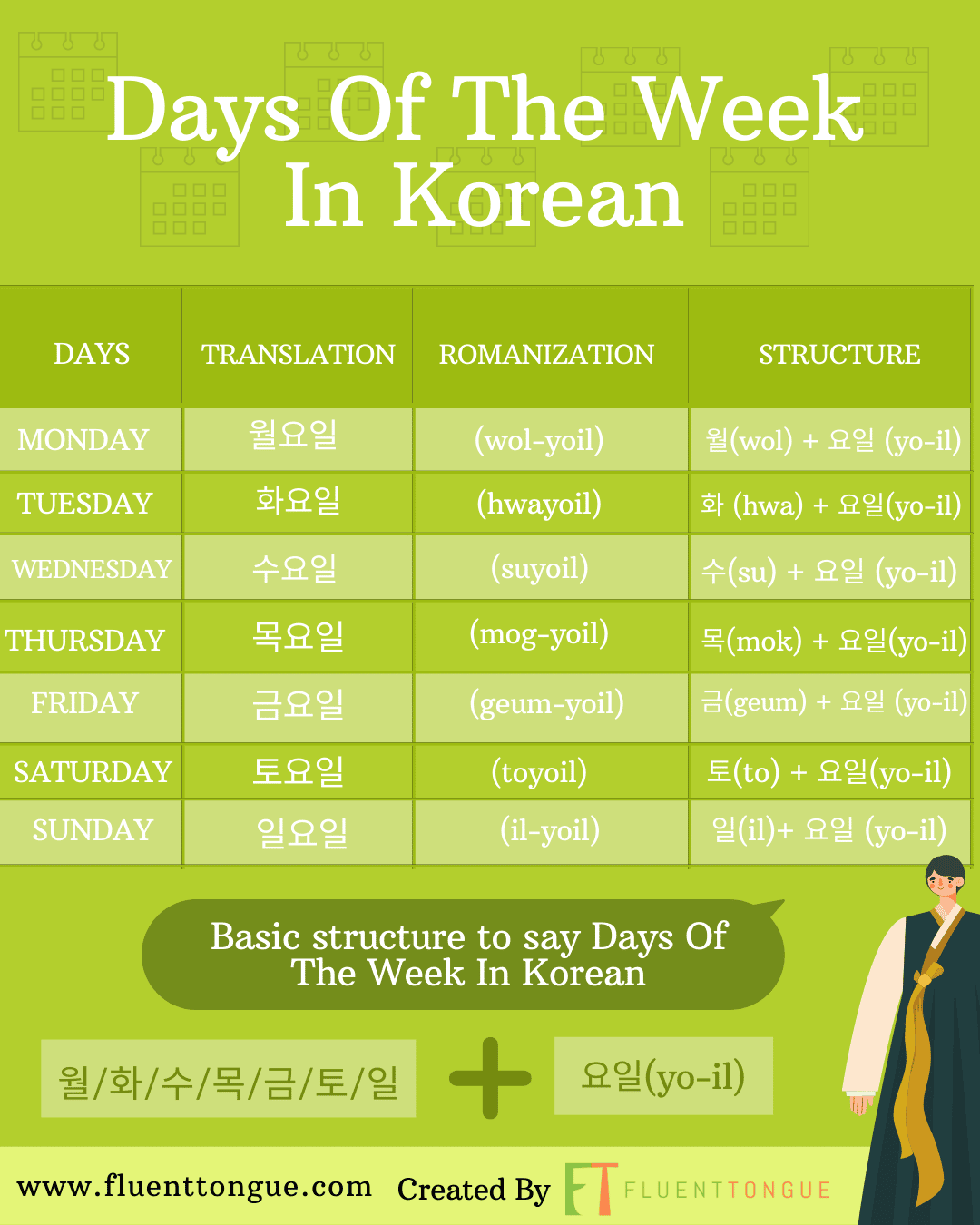
Monday in Korean
Monday in Korean is called 월요일( wol-yo-il) which is made up of two words; (wol) means “moon” and 요일 (yo-il) means “day of the week in Korea.”
Tuesday in Korean
Tuesday in Korean is 화요일(hwa-yo-il). It is made up of the words 화 (hwa) meaning “fire,” and 요일(yo-il). So Tuesday literally means “the day of fire (Hanja is 火)”.
Wednesday in Korean
Wednesday in Korean is called 수요일 (su-yo-il) and means the day of water as it contains the word 수(su).
Thursday in Korean
목요일(mok-yo-il) is Thursday in Korean where 목(mok) means “wood” and 요일(yo-il) means “days of the week “. so Thursday is the day of wood.
Friday in Korean
Friday in Korean is translated as 금요일(geum-yo-il). It is the combination of the words 금(geum) meaning “gold” and the word for Korean days of the week, “요일 (yo-il)”.So Friday is the day of gold(Hanja is 金).
Saturday in Korean
Saturday in Korean is called 토요일(to-yo-il) where 토(to) means “earth”. So Saturday is the day of the earth (Hanja is 土).
Sunday in Korean
일요일 (il-yo-il) is Sunday in Korean, where 일(il) means “sun” and 요일(yo-il) means “days of the week” in Korea. But 일 can also mean “day”.
So to say “sun in Korean”, you should use 태양 (tae-yang) not 일(il).
Notice
See, it’s easy, Right?
I hope you have this down by now.
if not, try repeating the days out loud or quietly a few times and you will have it memorized in no time.
Korean Days Of The Week Meaning: The Secret Meaning of the Days Of The Week in Korean.
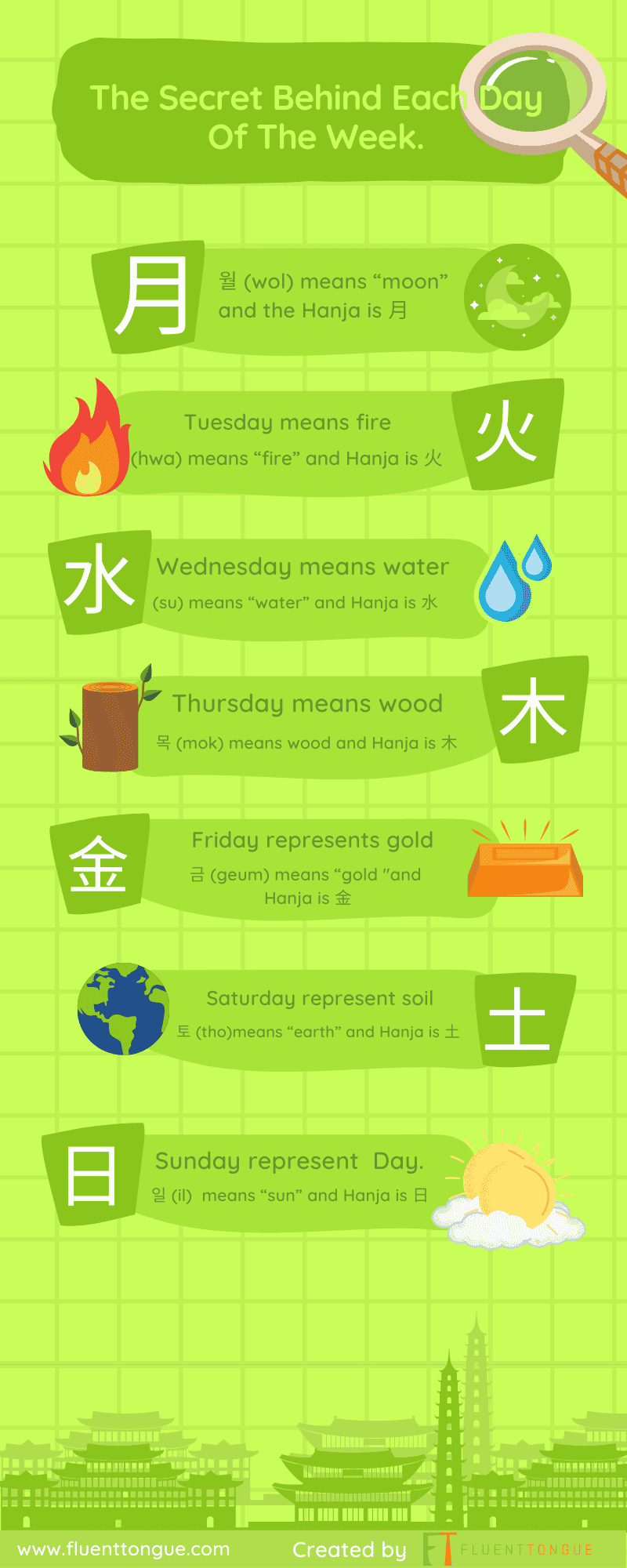
The meaning of the days of the week in Korean is based on the five elements of nature in Chinese culture(fire, water, wood, gold, earth) plus the moon and sun. Monday means moon, Tuesday means fire, Wednesday & Thursday means water and wood, Friday represents gold, while Saturday and Sunday each represent land(soil) and Day. days of the week meaning
Notice
Here is the complete list of hanja for 7 days of the week with its meanings, hanja, and pronunciation.
- 월 (wol) means “moon, so Monday is the day of moon(Hanja is 月).
- (hwa) means “fire” ,so Tuesday is the day of fire(Hanja is 火).
- (su) means “water” ,so Wednesday is the day of water(Hanja is 水).
- 목 (mok) means “wood “ so Thursday is the day of wood(Hanja is 木).
- 금 (geum) means “gold “, so Friday is the day of gold(Hanja is 金).
- 토 (tho) means “earth”,so Saturday is the day of earth(Hanja is 土).
- 일 (il) means “sun”, so Sunday is the day of sun (Hanja is 日).
How To Ask A Question About Korean Days of the week | What day is it in Korean?
Congrats! Now you can say the Korean days of the week. Why not try to ask about it?
Asking for days of the week formally
What day is it today?
오늘 무슨 요일이에요?
Today is Thursday
오늘은 목요일이에요.oneureun mogyoirieyo
Asking for days of the week in Korean in a causal way (talking with close friends or younger than you)
What day is it tomorrow?
내일 무슨 요일이야?naeil museun yoiriya
Tomorrow is Friday.
내일은 금요일이야.naeileun geumyoiriya
What day is July 4th?
7월 4일이 무슨 요일입니까?
chil wol sa iri museun yoirimnikka
How To Count Weeks In Korean? The Correct Way
So you want to learn how to count weeks in Korean? It’s pretty neat! And Here’s how you do it!
To count weeks in Korean, you first need to use the Sino-Korean numbers and add 주/주일 (Chu /Chu-eel) at the end.
Both 주일 or 주 mean the same thing when you’re talking about two or three weeks, but Korean people prefer to use 주 for four weeks and up.
Here’s the structure to count weeks in Korean :
Sino Korean numbers + 주/주일(Chu /Chu-eel)
Here is how to count weeks in Korean language with translation and pronunciation.
• one week –일주일-iljuil
• two weeks – 이 주일 (이 주*)- I-chu-il
• three weeks – 삼 주일 (삼 주*) – Sam-chu-il
• four weeks -사 주 – Sa-chu-il
• five weeks – 오 주 – O-chu-il
• six weeks – 육 주 – Yuk-chu-il
• seven weeks – 칠 주 – Chil-chu-il
• eight weeks – 팔 주 – Pal-chu-il
• nine weeks – 구 주 – Ku-chu-il
• ten weeks – 십 주 – Ship-chu-il
If you’re counting weeks in Korean like the first week, second week, third week, and so on……, you’ll need to use native Korean numbers and end it with 주(chu).
Notice
The structure to count weeks in Korean will look like this
Native Korean numbers + 주(Chu)
Let’s see some example
• first week –첫(째*) 주
• second weeks – 둘째 주
• third weeks – 셋째 주
• fourth weeks – 넷째 주
• fifth weeks – 다섯째 주
• sixth weeks – 여섯째 주
• seventh weeks – 일곱째 주
• eighth weeks – 여덟째 주
• ninth weeks – 아홉째 주
• tenth weeks – 열째 주
What do you think? Easy right?
Examples
You got all Korean days of the week, right? Great job!!!
Let’s bring this up a notch and make some sentences. But first, you need to add 6 words to your Korean vocabulary list.
How To Say Yesterday, Today, and Tomorrow In Korean?
Here is how to say The day before yesterday, Yesterday, Today, Tomorrow, The day after tomorrow in Korean!
- Today in Korean –오늘 – oneul
- Tomorrow in Korean – 내일 – naeil
- Yesterday in Korean – 어제- oje
- The Day before Yesterday- 그제 – geuje
- The Day after Tomorrow- 모레 – mole
If you know them, just skip it.
How Do You Say Today In Korean?
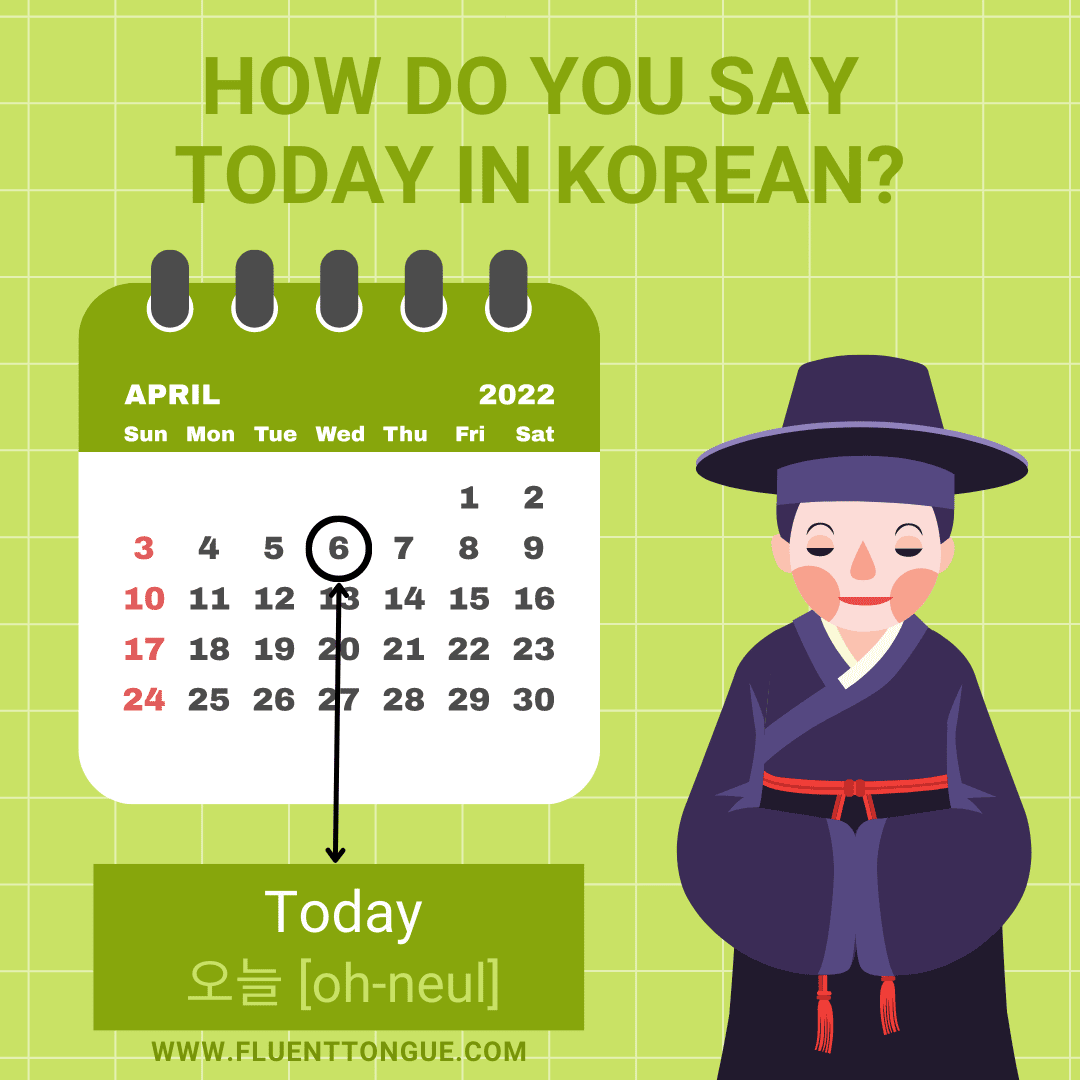
The basic way to say today in Korean 오늘 [oh-neul].but the words 금일 (geumil), 요즘 (yojeum), and 오늘날 (one ullal) also mean the today in Korean.
However, it depends on the meaning you want to express.
The word “요즘 (yojeum)” literally means “present day,” but when talking about the present vs. the past, it is usually used as “today.”
Just Use it as an adverb or noun, and place it at the beginning of a sentence.
Sample Sentences Using Today in Korean
Today is Tuesday, right?
오늘이 화요일 맞지? – oneuri hwayoil matjji
What did you do today?
오늘뭐했어? – oh-neul mwo haesso?
I just got paid today. I’ll treat you to dinner tonight.
오난 오늘 월급받았어. 오늘 저녁은 내가 살게.
Are you busy today?
오늘 바쁘세요?- oneul bappeuseyo
I’m not working today.
오늘 바쁘세요?- oneul bappeuseyo
How To Say Tomorrow In Korean Language?

Here is how to say “Tomorrow” in Korean, which is 내일 (naeil). But Koreans also use two other words, i.e. 장래 (jangnae) and 명일 (myeongil). The only difference between 내일 (naeil) and 명일 (myeongil) is that 명일 (myeongil) comes from China and is rarely used in everyday conversation (used for official and academic purposes).
Now let’s make some simple sentences.
Tomorrow is Friday.
내일은 금요일이에요-naeireun geumyoirieyo
I have a piano lesson tomorrow.
난 내일 피아노 교습이 있어. – nan naeil piano gyoseubi isso
See you tomorrow
내일 보자 -naeil boja
What are you doing tomorrow?
내일 뭐 거야? -naeil mwo goya
How To Say Yesterday In Korean Language?
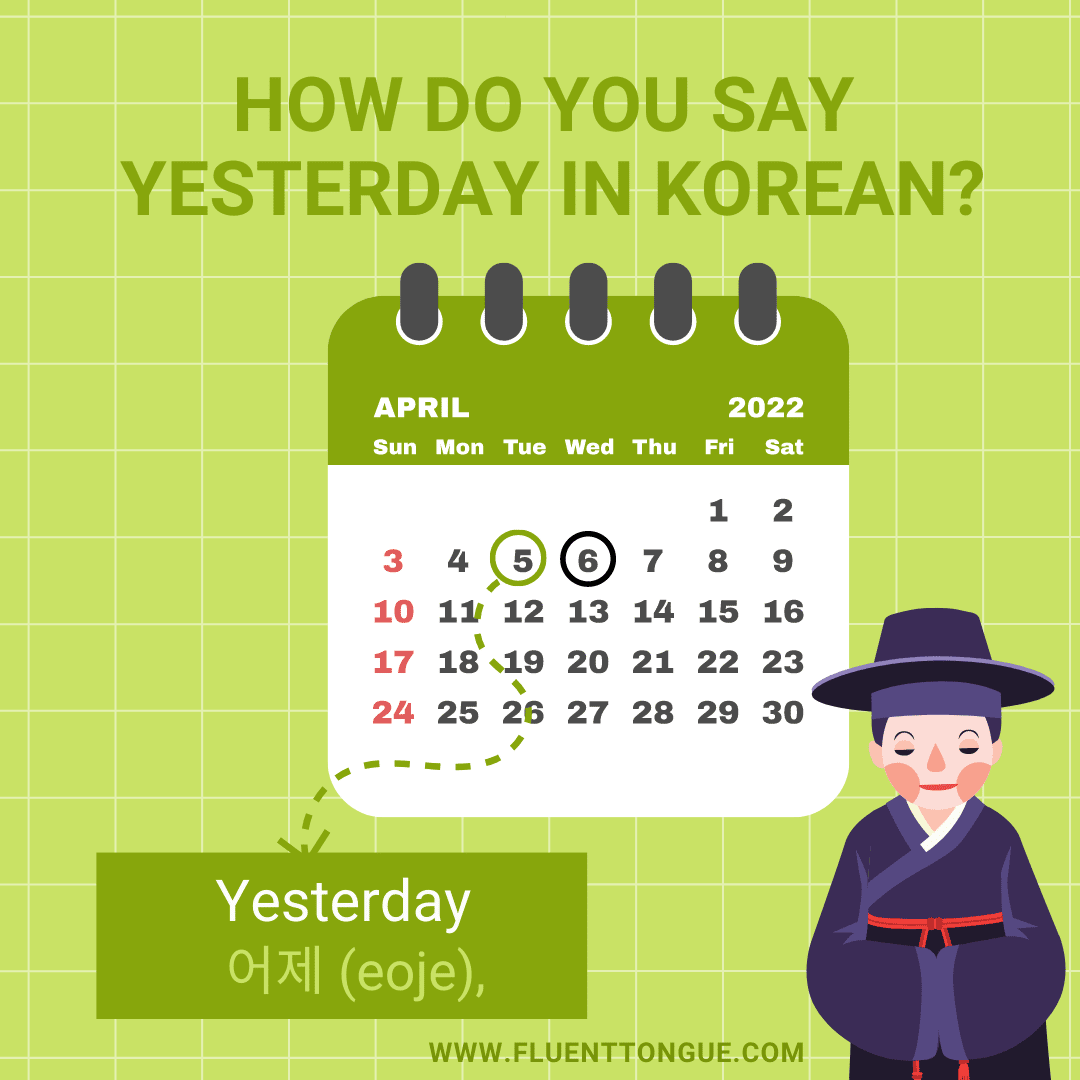
The word 어제 (eoje), is literally translated as yesterday in Korean. 작일 (jagil) also means yesterday in Korean. The only difference between them is 작일 (jagil) loan word from Chinese and only used in academics.
So, Let’s dive deeper with examples, shall we?
EXAMPLE SENTENCES
Isn’t it cold yesterday?
어제는 춥지 않니?- eojeneun chubji anhni?
It snowed a lot yesterday.
어제 눈이 많이 왔어요.-oje nuni mani wassoyo
What did you do yesterday?
어제 뭐했어? – oje mwo haesso
How To Say Day After Tomorrow In Korean?

To say the day after tomorrow/ two days later in Korean you can use the word 내일모레(naeil more) and 모레(more). But 내일모레(naeil more) is also used when you want to talk about a future event that will happen soon But hasn’t happened yet. Usually, old people used this more often.
EXAMPLE SENTENCES
I will be 70 the day after tomorrow.
내일모레 70살이다- naeilmore chilsip sarida
What are you going to do the day after tomorrow?
모레 뭐 할 거예요?- more mwo hal goeyo
The test is the day after tomorrow.
시험은 모레야. sihomeun moreya
Korean Vocabulary For Beginners Related To Weeks
Oops!!!!! So many words to remember… so little time
I get it. You hate remembering words (well, who doesn’t).
But our advice to you is to learn all of these words! You never know what you’re going to hear in real life!
And This list will come in handy.
- Weekly/every week- 매주 (mae-ju)
- Week –주 (ju)
- Weekend in Korean – 주말 (ju-mal)
- Weekday in Korean -평일 (pyeong-il)
- Once a week – 일주일에 한번(iljuire hanbon)
- twice a week-일주일에 두 번-iljuire du bon
- Once every four weeks – 4주에 한 번-sa jue han bon
- This week- 이번주 (i-beon-ju)
- Last week – 지난주 (ji-nan-ju)
- Next week – 다음주 (da-eum-ju)
- On the weekend – 주말에-jumare
- During the week – 주말 동안-jumal dongan
- The Week before last- 지지난주 (ji-ji-nan-ju)
- The Week after next week – 다다음주 (da-da-eum-ju)
- This Friday – 이번 금요일- ibon geumyoil
- Next Sunday -다음 일요일- daeum iryoil
- Monday evening -월요일 저녁-woryoil jonyok
- Friday night – 금요일 밤- geumyoil bam
- Thursday morning – 목요일 아침- mogyoil achim
- Last Tuesday – 지난 화요일-jinan hwayoil
- every Tuesday – 매주 화요일-maeju hwayoil
- Next weekend – 다음 주말-daeum jumal
Wow, that was long. Full of filler content.
Let’s keep it moving…
Bonus Lesson: How Would You Say “Months” in Korean?
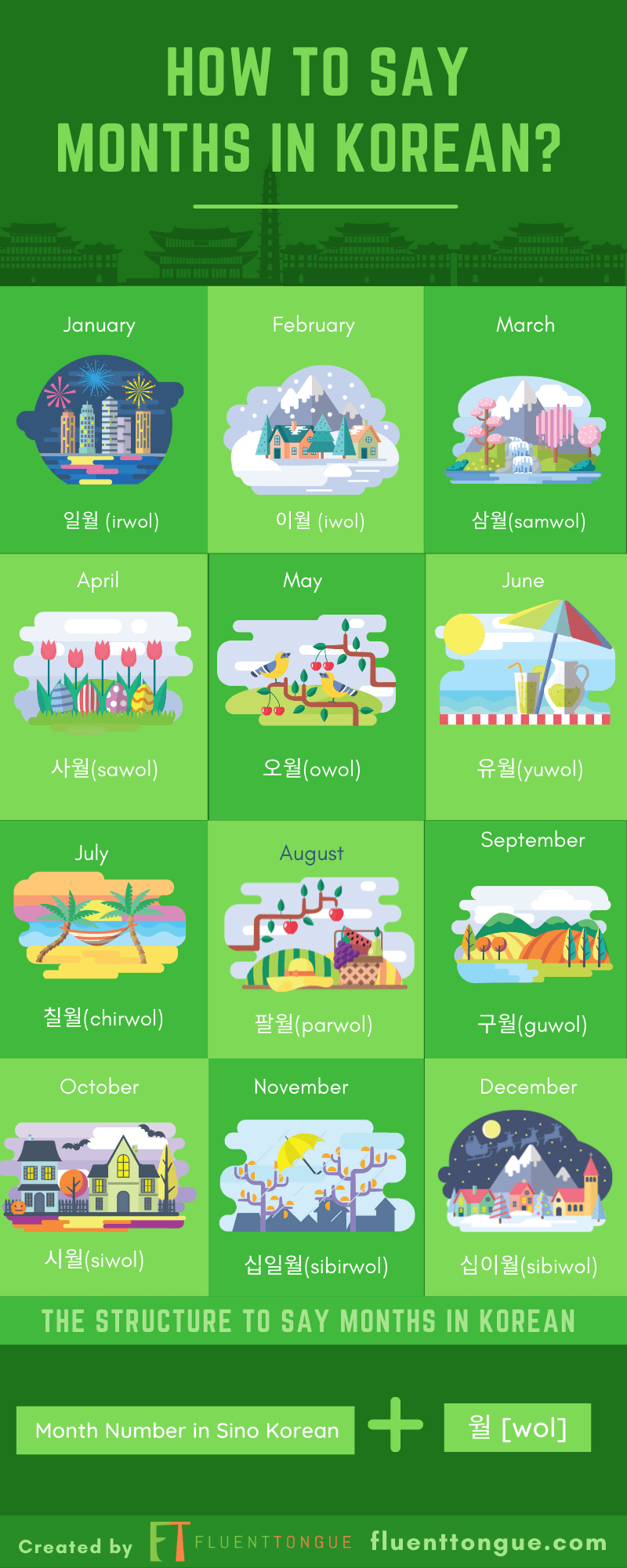
In English, you need to memorize new words every month. But in Korean, you don’t! and here’s how to do it.
A month in Korean is called 월 (wol). To say the months, just add a month number in Sino Korean followed by 월 (wol). A month number means January is the first month of the year, February is the second month of the year, and so on. Here’s a list of all the months in Korean with hangul and pronunciation.
- January – 일월 (irwol) – 일(1)+ 월(wol)
- February – 이월 (iwol) -이(2)+ 월(wol)
- March – (삼월)(samwol) – 삼(3)+ 월(wol)
- April -(사월) (sawol) – 사(4)+ 월(wol)
- May -오월(owol)- 오(5)+ 월(wol)
- June -유월 (yuwol)
- July -칠월 (chirwol)- 칠(7)+ 월(wol)
- August -팔월(parwol) – 팔(8)+ 월(wol)
- September -구월(guwol) – 구(9)+ 월(wol)
- October -시월(siwol)
- November -십일월 (sibirwol) – 십일(11)+ 월(wol)
- December -십이월(sibiwol) – 십이(12)+ 월(wol)
Here’s the structure to say “months” in Korean.
[ month number in Sino korean] + 월 [wol]
For example, say August (which is the 8th month of the year). So add “8” is 팔 (pal) in Korean, followed by 월 (wol), meaning “months.” So it becomes (팔월) (palwol).”
Wow! Did you know that June[유월 (yuwol)] and October[시월(siwol)] are not following the pattern?
The real reason is simple. “육월” and “십월” are a little difficult to say.
When counting months, you can either use 달 or 개월.
pure Korean numbers are used with the word 달 and you must use the Sino-Korean numbers while using 개월. They both mean the same.
EXAMPLES
I took a Korean class for 4 months
저는 두 달 동안 한국어 수업을 들었어요
I took an English class for 7 months
저는 이 개월 동안 한국어 수업을 들었어요
More example, in months in Korean,
Today is December 5th.
오늘이 12월 5일.
I was born on January 12.
저는 1월 12일 입니다.
I’ll be in Vegas from the 28th of December until the 1st of January.
12월 28일부터 1월 1일까지 라스베가스에 있을 거야.
My birthday is February 7. Today is December 5th.
내 생일은 2월 7일이다
I will graduate next February.
나는 내년 2월에 졸업한다. – naneun naenyon i wore joropanda
His lunar birthday is February 2nd.
그의 음력 생일은 2월 2일이다
September is the ninth month of the year
9월은 일 년 중 아홉 번째 달입니다. – gu woreun il nyon jung ahop bonjjae darimnida
Bonus Lesson: How Do You Count Days In Korean?
Korean have different ways to count days. I am going to show you how to pronounce them.

Here’s how to count days in Korean from 1day to 30 days with hangul and pronunciation.
- One day – 하루 (ha-ru)
- Two days – 이틀 (i-teul)
- Three days – 사흘 (sa-heul)
- Four days – 나흘 (na-heul)
- Five days – 닷새 (dat-sae)
- Six days – 엿새 (yeot-sae)
- Seven days – 이레 (i-re)
- Eight days – 여드레 (yeo-deu-re)
- Nine days – 아흐레 (a-heu-re)
- Ten days – 열흘 (yeol-heul)
You don’t have to remember everything from one day to 30 days. Koreans don’t use it in all of their everyday life conversations because it is an old way to count days.
But only 6 of them (i.e. one day, 2 days, 3 days, 4 days, 10 days, and 15 days) used a lot of time and the others just used the roman number instead.
The Korean lunar calendar doesn’t have a 31st. so you can count from 1st to 30th.
In the middle of the month (from 11 days to 20 days),
- 11 days – 열하루 (yeolha-ru)
- 12 days – 열이틀 (yeoli-teul)
- 13 days – 열사흘 (yeolsa-heul)
- 14 days – 열나흘 (yeolna-heul)
- 15 days – 보름(boreum)
- 16 days – 열엿새 (yeolyeot-sae)
- 17 days – 열이레 (yeoli-re)
- 18 days – 열여드레 (yeolyeo-deu-re)
- 19 days – 열아흐레 (yeola-heu-re)
- 20 days -스무날 (seumunal)
The last 10 days of the month(from 21 days to 30 days)
- 21 days -스무하루(seumu ha-ru)
- 22 days -스무이틀 (seumui-teul)
- 23 days -스무사흘 (seumusa-heul)
- 24 days – 스무나흘 (seumu na-heul)
- 25 days – 스물닷새 (seumu dat-sae)
- 26 days – 스무엿새 (seum uyeot-sae)
- 27 days – 스무이레 ( seumu i-re)
- 28 days -스무여드레 (seumu yeo-deu-re)
- 29 days -스무아흐레 (seumu a-heu-re)
- 30 days -그믐(geumeum)
EXAMPLE SENTENCES
I have to work three more days.
사흘 더 일해야 한다. – saheul do ilhaeya handa
Let me borrow this dress for one day.
하루만 이 원피스 빌려 줘. – haruman i wonpiseu bilryo jwo
There are two days left.
이틀 남았어요.- iteul namassoyo
I studied for two days.
이틀 동안 공부했어요.- iteul dongan gongbuhaessoyo
I ate gamja-tang for 2 days
이틀 동안 감자탕을 먹었어요. – iteul dongan gamjatangeul mogossoyo
How to use Days of the Week In a real-life conversation?
If you love to learn real Korean, not just some bookish phrases, you are gonna love these Korean phrases.
After all, what’s the point of learning Korean when you chat with locals?
So, it’s time to earn some real Korean
Example conversation
setting up an appointment with a friend.
Shall we watch a movie tomorrow?
내일 영화 볼까요?naeil yonghwa bolkkayo
No, I can’t? I have to work. how about this weekend?
안 돼요? 일이 있어요.이번 주말은 어때요?-ian dwaeyo iri issoyo ibon jumareun ottaeyo.
I have plans for Saturday. how about Sunday?
토요일에 바빠요. 일요일은 어때요? toyoire bappayo. iryoireun ottaeyo
Okay, sounds good. I am free. Then where should we meet?
좋아요.시간되요.그럼 어디서 만날까요?-joayo sigandweyo geurom odiso mannalkkayo
Let’s meet in front of the movie theatre.
영화관 앞에서 만나요- yonghwagwan apeso mannayo
Okay.
그래요 – geuraeyo
Bye
안녕. annyong
Bye
안녕. annyong
How To Memorize Korean Days Of The Week & Never Forget It?
The easiest way to memorize all 7 days of the week in Korean, is to recall the words “wol-hwa-su-mok-geum-to-il”( 월-화-수-목-금-토-일 ) and add “요일”(yo-il) at the end.
To help you remember the days of the week, try using them in your daily life as often as possible – even if it’s only in your head!
Korean Days Of The Week song
Did you know you can sing a song and master the 7 days of the week?
Well, what could be better than that?
Here is how Koreans do it all the time (now you can do it too!!!)
Use Mnemonics And Make A Story
It’s no secret that Using mnemonics and making a story is the way to memorize these piles of Korean words without lifting a finger.
So, why not try it here
Here is a funny video I got
The best memory trick to learn Korean Days Of Week with mnemonics
Use flashcards and Test
Maybe mnemonics is not your thing. What about flashcards?
I know it’s an old thing(you might be using Anki too)
But When it comes to mastering Korean vocabulary, you will never regret using these fellas.
Here are some other great resources for flashcards I found while I was learning Korean online
https://www.masteranylanguage.com/c/r/o/Korean/DaysOfWeek
https://kids-flashcards.com/en/free-printable/days-of-week-flashcards-in-korean
Other Online Resources
We live in the era of the 20th century.
And I bet you love to surf (well, who doesn’t?)
The internet is full of free stuff and language resources that you haven’t explored yet. Here is what I found when I was learning.
Here is a list (I hope it might help you)
https://en.wikipedia.org/wiki/Names_of_the_days_of_the_week
https://www.wikihow.com/Speak-Korean
Conclusion and Korean vocabulary quiz
See I told you in Korean language, it’s pretty easy to learn days of the week.
But when it comes to fluency, practice is the key
Even better
Talk about it with real people and plan a date or appointment or just talk about the week
It’s always important to plan, and now you’ll be able to keep track of your weekdays and weekends.
So go ahead, talk about it like what did you do this week?
Or tell me what you ate this week in Korean or how you learned Korean days of the week (in the comment below).
I love to hear your story.
korean vocabulary quiz: how many can you get right?
Answer in the comment below and see how many can get it right.

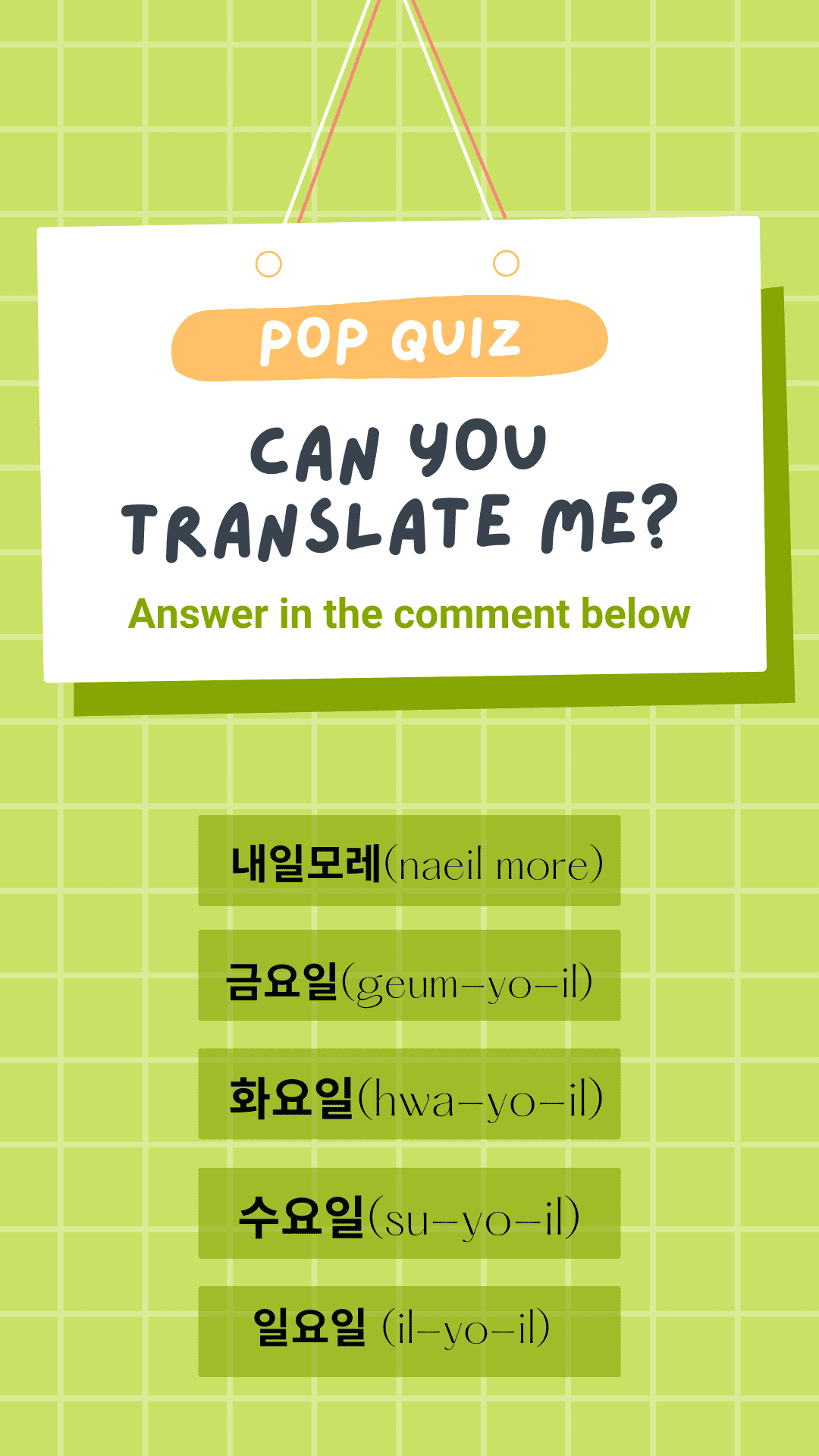
I am glad that you like our content. thanks for your support.